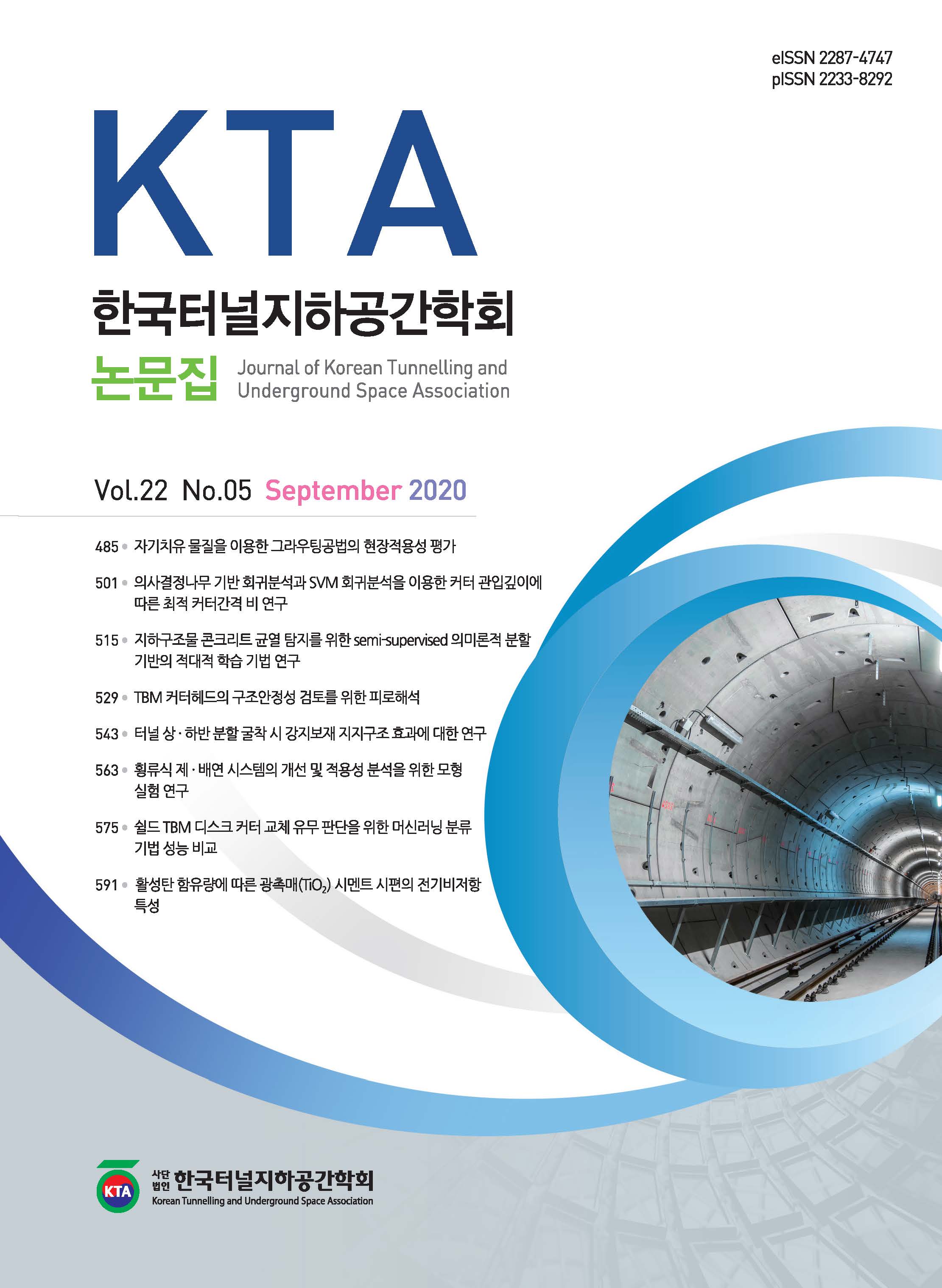- 권한신청
- P-ISSN2233-8292
- E-ISSN2287-4747
- KCI
 ISSN : 2233-8292
ISSN : 2233-8292
고성능 쉴드 세그먼트용 고로슬래그 미분말을 혼입한 콘크리트의 역학적 특성 및 증기양생 효과 분석
Mechanical characteristics of high-performance concrete shield segment containing ground granulated blast furnace slag and their improvement by steam curing
이진섭 (삼표건설)
이규필 (한국건설기술연구원)
장수호 (한국건설기술연구원)
배규진 (한국건설기술연구원)
- 다운로드 수
- 조회수
초록
본 연구에서는 쉴드터널에 사용되는 세그먼트의 성능향상과 경제성향상을 위하여 고로슬래그 미분말을 혼합한 고강도 콘크리트에 대한 기초 연구를 실시하였다. 특히, 설계강도가 60 MPa 세그먼트용 콘크리트에 대해서 고로슬래그 미분말의 최적 치환율과 최적의 증기양생 조건을 도출하고자 하였다. 이상의 결과로부터, 고로슬래그 치환율 50%와 단위수량 125 kg/m3일 경우가 성능과 경제적인 측면에서 가장 적합한 배합조건으로 나타났다. 또한 표준양생 조건과 비교할 때 증기양생에 의하여 약 110~442%의 강도증진 효과를 기대할 수 있는 것으로 확인되었다.
- keywords
- Shield tunnel, segment, ground granulated blast furnace slag, steam curing, 쉴드터널, 세그먼트, 고로슬래그 미분말, 증기양생, Shield tunnel, segment, ground granulated blast furnace slag, steam curing
Abstract
This study aimed to evaluate the applicability of high-strength concrete mixed with blast furnace slag to shield segment lining in order to improve its performance and economic efficiency. Especially, it was also intended to derive the optimum replacing ratio of ground granulated blast furnace slag to ordinary cement as well as the optimum stream curing condition for shield segment concrete with the design strength of 60 MPa. From the a series of experiments, the condition of 50% replacement of ordinary cement by ground granulated blast furnace slag and unit water content of 125 kg/m3 was proposed as the optimum mixing condition. Comparing with standard curing conditions, it was also possible to expect approximately 110~442% strength improvement of concrete by steam curing in the same mixing condition.
- keywords
- Shield tunnel, segment, ground granulated blast furnace slag, steam curing, 쉴드터널, 세그먼트, 고로슬래그 미분말, 증기양생, Shield tunnel, segment, ground granulated blast furnace slag, steam curing
참고문헌
1. 문한영, 최연왕, 김용직(2001), “고로슬래그 미분말 혼합 콘크리트의 온수양생법에 의한 강도 추정”, 대한토목학회논문집, Vol. 21, No. 6-A, pp. 967~976.
2. 이상수, 원철, 김동석, 박상준(2000), “고로슬래그 미분말을 사용한 콘크리트의 공학적 특성에 관한 연구”,한국콘크리트학회논문집, Vol. 12, No. 4, pp. 49~58.
3. 문한영, 최연왕(1996), “고로슬래그 미분말을 혼화재로 사용한 고강도콘크리트의 강도 특성에 관한 연구”,대한토목학회논문집, Vol. 16 No. I-4, pp. 463~472.
4. 沼田晉一(1995), “高爐スラグ微粉末混和コンクリートの動向”, コンクリート工學, Vol. 33, No. 5, pp.15~24.
5. Rahhal, V.F., Bantic, O.R. (1994), “Mineral Admixtures Contribution to the Development of Heat of Hydration and Strength, Cement”, Concrete and Aggregates, CCAGPD, Vol. 16, No. 2, pp. 150~158.
6. 민경환, 정형철, 양준모, 윤영수(2009), “대단면 터널 라이닝 적용 고성능 콘크리트의 수화열 특성”, 한국터널공학회논문집, Vol. 11, No. 1, pp. 37~46.
7. 이상근, 김동인, 조규성(2001), “터널라이닝 구조재로서 SFRC 적용에 관한 연구”, 한국터널공학회논문집, Vol. 3, No. 4, pp. 25~34.s
8. 김상면, 신진용, 마상준, 남관우, 김기호(2008), “숏크리트 구성 재료에 따른 콘크리트 성능에 관한 실험적 연구”, 한국터널공학회논문집, Vol. 10, No. 1, pp. 59~68.
- 다운로드 수
- 조회수
- 0KCI 피인용수
- 0WOS 피인용수

